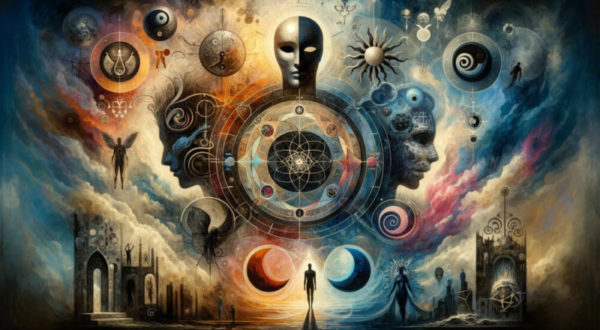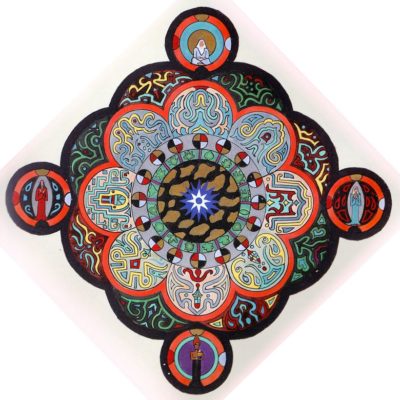This year I found a way to integrate my long-time love for and interest in Jungian Psychology with my skills and experience as a private yoga instructor. After years of wondering whether or not to pursue a counseling license (and basically knowing I likely wouldn’t), I stumbled on “Jungian Life Coaching.” Call it “Jungian Analysis Lite.”
I kid, though I did at first dismiss the notion as a kind of watered down approach to the Jungian analytic process, or co-optation of Jungian thought for the corporate world. I was uncomfortable with the label “coach”; I’ve seen women 30 years my junior hawking their wellness wares as “life coaches” and I would definitely not be doing that. But maybe Jungian Life Coaching has an approach to offer that Jungian Analysis doesn’t; Jungian Analysis has after all, historically “treated” people who didn’t always meet the need for traditional psychiatric or psychological treatment or therapy. They just had big questions – about their lived experiences, their meaningful contributions, and how the rest of their lives might be lived more authentically – more spiritually grounded, more creatively, and more compassionately.
A few months ago I clicked through to see what “Jungian Life Coach” training entailed (though when I say “this training” I should explain that there are many more than just one). I found a legitimate program: months long, quality content, online/in person, newsletter/podcast/blog sign up, free introductory video content that gives an overview of the certification and how it’s different from therapy or general life coaching, how their program would also marry Eastern and Western psychological concepts, as Jung did, and a live person to talk to when you’re ready to explore further. No pricing though, which told me it was likely very pricey.
Here’s the thing. I already have a lot of Jung under my belt. I have a lot of the esoterica of yoga under my belt. I know about Jung’s relationship with the East. I don’t need the Jungian introduction. I needed a review of Jungian concepts and an overview of how “coaching” works and in what contexts a “coach” can be an effective guide when therapy is not called for.
For those not familiar with Jungian psychology, here are the basic tenets:
I. Archetypes. “Creator.” “Mother.” “Child.” “Warrior.” “Hero.” “Orphan.” “Sage.” If you’re familiar with the maxim “I contain multitudes” (from Walt Whitman’s poem “Song of Myself), you have an inkling of the concept of archetypes. Archetypes are part of the ground of the collective unconscious, a stratum that according to Jung, we all share as conscious beings and that each personality draws from in the creation of its unique personality.

You might think of them in the way you think of Platonic forms – they are ideas in the way that “chair” symbolizes something that gets expressed uniquely, though there is no actual, material “ur”-chair out there we can see or touch or sit in. In the development of personality, some archetypes come to the forefront, others remain undeveloped. In Jungian Coaching, we look at these as potentialities in the personality that could help further psychological growth and satisfaction in spheres of family, work, creative life, or other relationships.
II. Personality Type. As in “introvert” vs. “extrovert.” If you’ve ever completed the Myers-Briggs Personality Type Indicator (or “MBTI”) you’re familiar with personality type. Each type is further elaborated into subtypes of “sensing” vs. “intuition”; “thinking” vs. “feeling”; “judging” vs. “perceiving.” In Jungian Coaching, establishing and exploring the client’s personality type is essential in charting a path for further work with development of the archetypes and work with dream material.
III. Persona, Ego and Shadow. Layers of personality: “persona” is that outer personality the world sees. The “ego” is the conscious personality consisting of both persona and our inner consciousness. The “shadow” is composed of the parts of personality we reject or repress. In Jungian Coaching we work to “deconstruct” our layering and we work to uncover our shadow parts in order to become a more integrated, “individuated” personality. Taking a cue from iRest(r), we often call upon beliefs or “cognitions” about ourselves in order to help us manifest the opposite belief: “I am responsible” held simultaneously with the belief “I am irresponsible.” We do this in order to see that these beliefs or “cognitions” are not “who we are” at the level of pure awareness. In Jungian Coaching shadow work, we come to see that we are all composed of opposites; we simply choose to forefront those that work to our advantage, and repress those that don’t. When we repress or reject, these qualities often present as “projection” – we “project” onto others that which we reject in ourselves.
IV. Individuation. The process of becoming a whole, integrated personality. This is the work of Jungian Coaching. We work with the archetypes, dream contents, personality type and shadow in order to more wholly occupy our fullest sense of self. We can all work toward individuation without therapy or analysis (though the work often mirrors that undertaken formal therapy sessions). For those of us that are cognitively sound (more or less), the work of individuation is our opportunity to bring to light that “thing” we sense we are missing as we move into the latter half of our lives. Whether that “thing” is a career shift, the cultivation of an authentic spirituality, or the development of intrinsic creative gifts, having the opportunity to examine the “multitudes” within is key to creating a deeper, richer, satisfying inner and outer life.

My work with private clients always begins with an assessment of goals and needs. Working one on one has allowed me to customize a client’s practice that meets those specific criteria. A one on one is also a more personal relationship; we get to know a lot about one another’s lives, most often revolving around issues of family, work, and health. Sometimes we relate specific practices back to whatever the contours of that particular struggle might be. Other times I simply offer a compassionate ear and heart. Life coaching in a sense “formalizes” the work with the life issues, within a specifically Jungian framework as outlined above, with the added dimension of somatic yoga that helps us to keep issues that seem limited to “mind” as integral with our embodied lives.
I am so excited to offer this modality of true “psyche” (mind) “somatic” (body) life work. If you think Jungian Life Coaching could help you, please contact me.